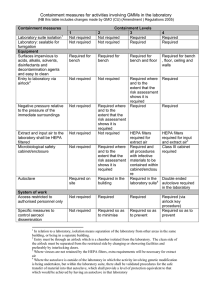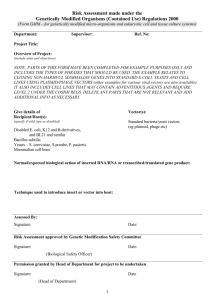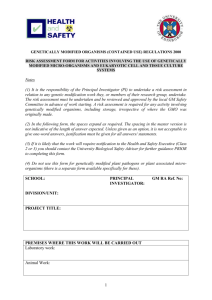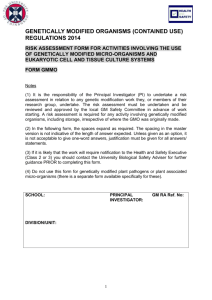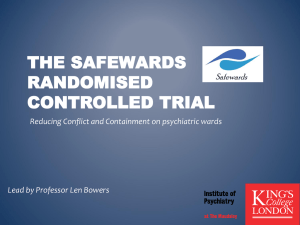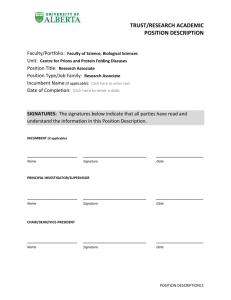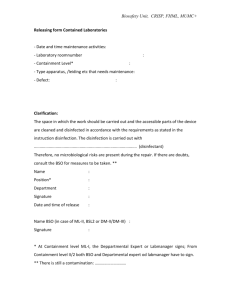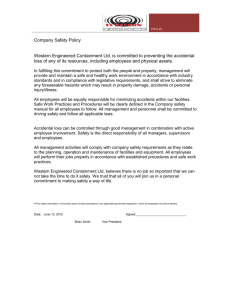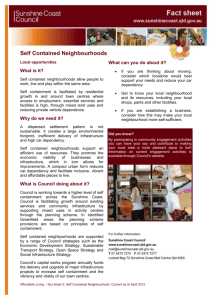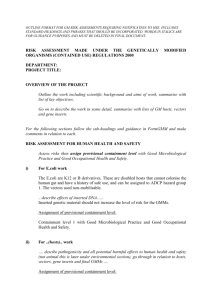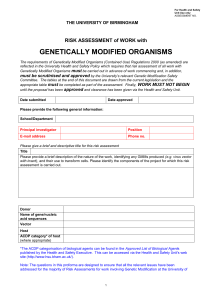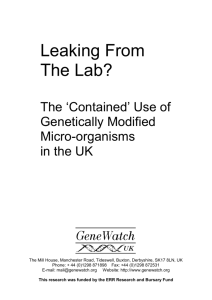Containment Level
advertisement
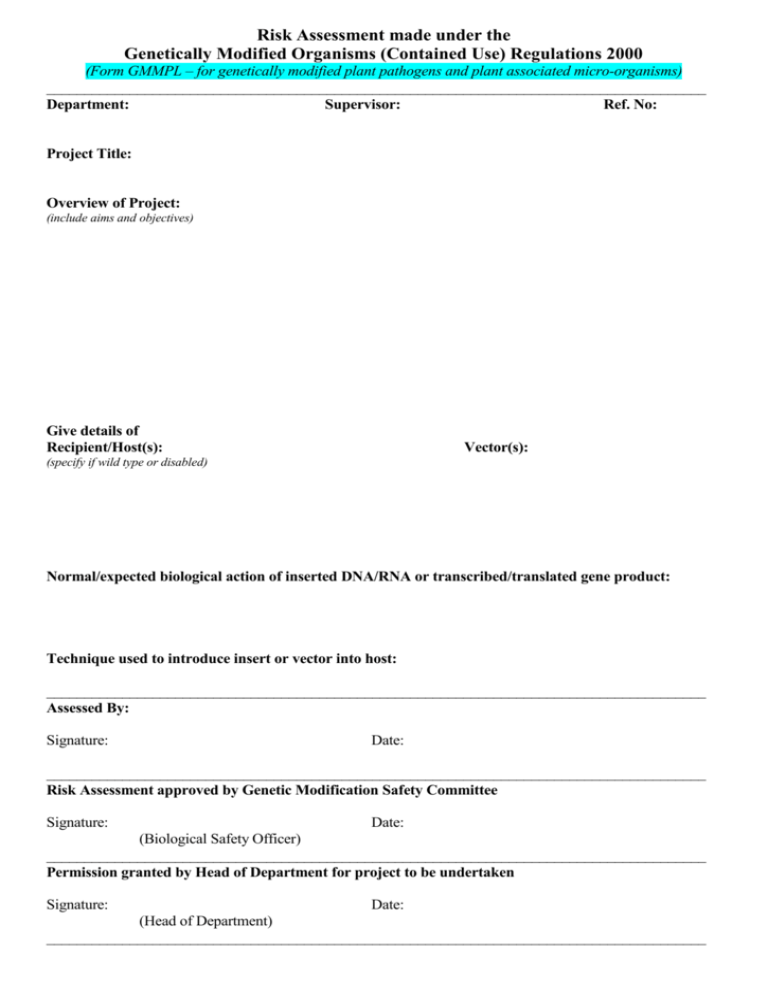
Risk Assessment made under the Genetically Modified Organisms (Contained Use) Regulations 2000 (Form GMMPL – for genetically modified plant pathogens and plant associated micro-organisms) _______________________________________________________________________________________ Department: Supervisor: Ref. No: Project Title: Overview of Project: (include aims and objectives) Give details of Recipient/Host(s): Vector(s): (specify if wild type or disabled) Normal/expected biological action of inserted DNA/RNA or transcribed/translated gene product: Technique used to introduce insert or vector into host: _______________________________________________________________________________________ Assessed By: Signature: Date: _______________________________________________________________________________________ Risk Assessment approved by Genetic Modification Safety Committee Signature: Date: (Biological Safety Officer) _______________________________________________________________________________________ Permission granted by Head of Department for project to be undertaken Signature: Date: (Head of Department) _______________________________________________________________________________________ RISK ASSESSMENT FOR ENVIRONMENTAL HARM Environmental hazard identification - Identify any potentially harmful properties of: i) the recipient micro-organism GUIDANCE Potentially harmful effects include: disease to animals including allergenic and toxic effects disease to animals and plants ii) the inserted (donated) genetic material iii) the donor micro-organisms (where used/appropriate) iv) the vector adverse effects resulting from inability to treat disease or offer effective prophylaxis adverse effects resulting from establishment or dissemination of the GMMs in the environment adverse effects resulting from the natural transfer of inserted genetic material to other organisms v) the resulting genetically modified micro-organism Where potentially harmful effects are identified estimate: i) consequence/severity of effects Select from: Severe/Medium/Low/Negligible ii) likelihood of effects being realised Select from: High/Medium/Low/Negligible iii) overall risk Select from: High/Medium/Low/Effectively zero Control measures - Assign provisional containment level required to reduce risks to low/effectively zero Containment Level: with Good Microbiological Practice and Good Occupational Safety and Hygiene NATURE OF WORK TO BE UNDERTAKEN Assign a provisional containment to control the hazards identified above taking account of severity of any consequence and likelihood of harm occurring. Select from 1, 2 , 3 or 4 Give brief description of types of laboratory procedures including maximum culture volumes at any one time (show as multiples on unit volumes) GUIDANCE Consider any activities that may involve risks which require specific additional control measures such as: Provide details of any non-standard laboratory operations inoculation of animals or plants with GMMs the use of equipment or procedures likely to generate aerosols Additional control measures required for specific risks: large scale work RISK ASSESSMENT FOR HUMAN HEALTH AND SAFETY Human health hazard identification - Identify any potential harmful properties of: i) the recipient micro-organism (for micro-organisms also give ACDP hazard group) ii) the inserted (donated) genetic material iii) the donor micro-organisms (where used/appropriate) GUIDANCE Potentially harmful effects include: disease to humans - consider all properties which may give rise to harm eg infection, toxins, cytokines, allergens, hormones etc alteration of existing pathogenic traits - consider alteration of tissue tropism or host range, alteration in susceptibility to human defence mechanisms etc adverse effects resulting from inability to treat disease or offer effective prophylaxis iv) the vector v) the resulting genetically modified micro-organism possibility for any disablement or attenuation to be overcome by recombination or complementation adverse effects resulting from the potential for transfer of inserted genetic material to another microorganism Additional control measures required to reduce all risks to low/effectively zero: CLASSIFICATION AND ASSIGNMENT OF FINAL CONTROL MEASURES Consider each item on Table 1a indicate whether or not it is required taking account of the provisional containment level assigned to protect human health and safety and any additional control measures necessary to control specific activities and environmental risks Consider also Tables 1b and 1c where appropriate GUIDANCE Mark up table by circling for each item the first correct answer reading across the table from left to right Classification: The highest numbered column in which a control measure is required indicates the Class of the activity circle class on table 1a Class: Assign corresponding level of containment: Containment Level: specify any other control measures required The class number indicates the minimum containment level required Table 1a: Containment Measures for Activities involving GMMs in Laboratories Where an item is listed as "may be required" this indicates the item to be an option at that particular containment level and its requirement should be determined by the risk assessment for the particular activity concerned. Delete no or yes as indicated by risk assessment. Containment Measures Containment Levels 1 2 3 4 Isolated laboratory suite not required not required required required Laboratory sealable for fumigation not required not required required required Surfaces impervious, resistant and easy to clean required for bench required for bench required for bench and floor required for bench, floor, ceiling and walls Entry to lab via airlock not required not required may be required no / yes required Negative pressure relative to the pressure of the immediate surroundings not required may be required no / yes required required HEPA filtered extract and input air not required not required required for extract required for input and extract Microbiological safety cabinet/enclosure not required may be required no / yes required required (class 3) Autoclave required on site required in the building required in the lab suite required in lab (double ended) Access restricted to authorised personnel not required required required required Specified measures to control aerosol dissemination not required required so as to minimise required so as to prevent required so as to prevent Shower not required not required may be required no / yes required Protective clothing suitable protective clothing required suitable protective clothing required suitable protective clothing required complete change of clothing and footwear Gloves not required may be required no / yes required required Control of disease vectors (eg rodents, insects) which could disseminate GMMs may be required no / yes required required required Specified disinfection procedures in place may be required no / yes required required required Inactivation of GMMs in effluent from handwashing sinks, showers etc not required not required may be required no / yes required Inactivation of GMMs in contaminated material and waste required by validated means required by validated means required by validated means required by validated means Laboratory to contain its own equipment not required not required required required An observation window or alternative so that occupants can be seen may be required no / yes may be required no / yes required required Safe storage of GMMs may be required no / yes required required secure storage required Written records of staff training not required may be required no / yes required required CLASSIFICATION CLASS 1 CLASS 2 CLASS 3 CLASS 4 Table 1b: Containment Measures for Activities involving GMMs in Plant Growth Facilities - TABLE 1a TO BE COMPLETED WITH THE FOLLOWING ADDITIONS/MODIFICATIONS: Where a item is listed as "may be required" this indicates the item to be an option at that particular containment level and its requirement should be determined by the risk assessment for the particular activity concerned. Delete no or yes as indicated by risk assessment. Containment Measures Containment Levels 1 2 Addition/ modification 3 4 Plant growth facilities: permanent structure (note 1) may be required no / yes required required required modification Entry via a separated room with two interlocking doors not required may be required no / yes may be required no / yes required (via airlock key procedure) addition Control of contaminated runoff water may be required no / yes required so as to prevent run-off required so as to prevent run-off required so as to prevent run-off addition Effective control of disease vectors (such as insects, rodents, arthropods) which could disseminate GMMs required required required required addition Effective control of pollen, seeds and other plant material which could disseminate GMMs may be required no / yes required so as to minimise dissemination required so as to prevent dissemination required so as to prevent dissemination addition Procedures for transfer of living material between the plant growth facilities, protective structure and laboratory shall control dissemination of GMMs required so as to minimise dissemination required so as to minimise dissemination required so as to prevent dissemination required so as to prevent dissemination addition CLASSIFICATION CLASS 1 CLASS 2 CLASS 3 CLASS 4 Note 1. A permanent structure refers to a fixed structure with walls, a roof and a floor. Where the structure is a green house, that structure shall also have a continuous waterproof covering, and self-closing lockable doors, and be located on a site designed to prevent the entry of surface run-off water.
